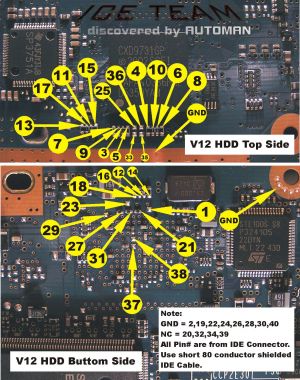PS2:Hard Drive Compatibility
There are multiple considerations in choosing a disk for use on a PS2. (Note that, in PS2 terminology, only official hard disk solutions and their direct equivalents are "HDD"s; never USB, FireWire, or network shares.)
Interface
All models of the PS2, except for the later ones, have an IDE interface but its form factor changed over time:
- SCPH-1xxxx models require a PCMCIA Network Adapter (SCPH-10190) and proprietary external HDD (SCPH-20400). Note that, while standard PCMCIA SSDs ("PC Card ATA") and even HDDs exist, they are not supported by any known PS2 software.
- 3xxxx and 5xxxx require a Network Adapter for the Expansion Bay (American type: SCPH-10281 with dial-up modem; domestic/international: SCPH-10350, Ethernet only, more expensive, fakes exist). The matching official disk is the SCPH-20401. See also the PS2:SATA Board for LAN Adapter page.
- 70xxx models have an integrated Network Adapter without a connector for the disk. One can manually be added ("Automan mod"), and surplus equivalent kits to do the same ("HD Connect") used to be available from MaxDiyPower.com until mid-2020. A premium version including a case replacement to house the disk, known as the "HD Combo", also existed. On these models, the HDD is not natively bootable, but PS2:FMCB can restore that functionality.
75xxx and higher series do not intrinsecally support any disk interface. Third party accessories like the "HD Pro" can provide the ability to connect a disk, but performance will be severely limited and compatibility restricted to software especially designed for the specific interface.
In 2018, two high-performance external storage products - known respectively as PS2NetBox and PS2USB2.0 - were manufactured for a short time. They are not recommended since, being original designs, they also require explicit support by software - and support for their closed source OPL and PopStarter mods was quickly dropped.
Brand
Only Sony-brand disks will be supported by official drivers, unless an ATAD patch (named after the disk driver) is applied; of course, this is not practical with original game discs, and backups loaded from HDD can't access the disk for their purposes in the first place. Homebrew drivers do not have this limitation.
Note that the exact position of power and data connectors on 3.5 inch IDE disks is not standardized and the movements of the Network Adapter's plugs may not be sufficient, unless partially disassembled to leave them loose. Maxtor and Seagate drives tend to fit the best.
Capacity
As the only official disks are 40 GB, and part of the HDD drivers had to be finished before the Western launch (to support HDD booting), the official drivers only support 28-bit LBA addressing, therefore up to 137 GB. LBA48 patches are available, with the caveat listed above, for official drivers and most newer homebrew supports LBA48 out of the box. However, care must be taken to not mix LBA48 and LBA28 software to avoid corruption due to partitions crossing the limit of LBA28.
Additionally, due to the intrinsic design of the PS2's APA partition scheme (not using a conventional partition table, requiring a linear scan of the disk to determine its contents), exacerbated by the lack of cache that can be implemented in what's left of the 2 MB IOP memory after loading all other drivers, and of the inefficient method for doing said search, severe performance issues will be experienced after exceeding a certain number of partitions, very roughly approximatable to 80-120 GB. Recent versions of OPL use a list of installed games to be manually updated on demand to mitigate the problem, but it does not apply to any other software. The workaround is to go solid state.
Further, software that is LBA48 compatible but uses signed numbers for sector counts will be limited to 1 TB (assuming 512-byte sectors, in turn assumed - as the only contemporary standard - by PS2 software).
